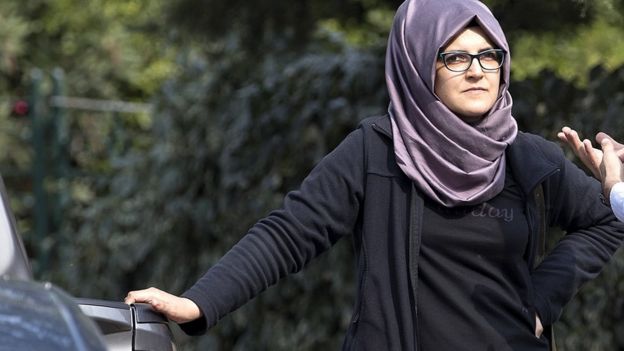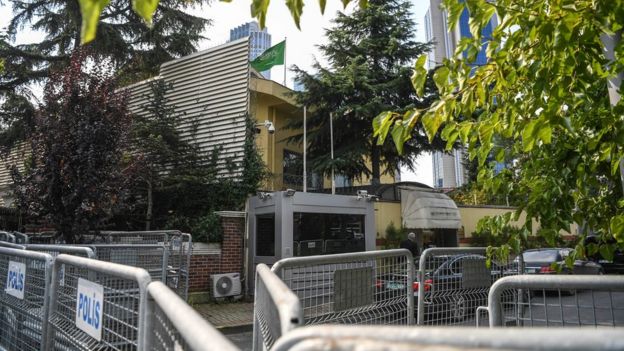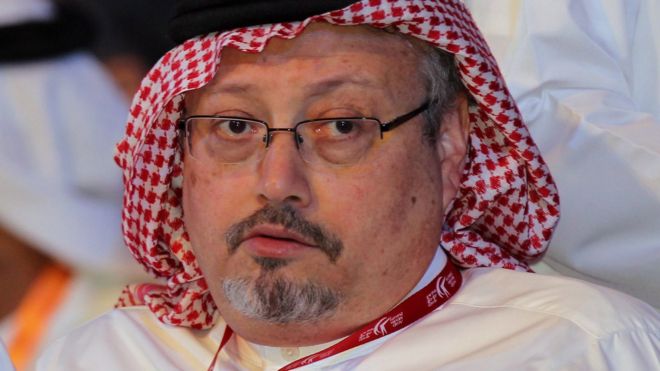Turkey says journalist was murdered in Saudi consulate
Fears are growing over missing
Washington Post writer Jamal Khashoggi, after Turkish officials said
they believe he has been murdered.
Mr Khashoggi, a Saudi national, went missing after visiting the Saudi consulate in Istanbul on Tuesday. A Turkish official told the BBC that initial investigations indicated he was murdered there.
Saudi Arabia has denied the accusations, saying it is "working to search for him".
The Washington Post said it would be a "monstrous and unfathomable act" if he had been killed.
The BBC's Istanbul correspondent, Mark Lowen, said it would plunge Turkish-Saudi relations into an unprecedented crisis.
Turkish officials have opened an investigation and have been speaking to the media on condition of anonymity.
They have not given any evidence for their claim, nor suggested how he might have been killed.
When was he last seen?
Jamal Khashoggi is a high-profile critic of Saudi Arabia's Crown Prince Mohammed bin Salman. He has more than 1.6 million Twitter followers and has written for the Washington Post opinion section.On Tuesday, he went to the consulate to obtain a document certifying he had divorced his ex-wife, so that he could marry his Turkish fiancée, Hatice Cengiz.
Ms Cengiz said she waited outside for 11 hours, but he did not come out.
She said Mr Khashoggi was required to surrender his mobile phone, which is standard practice in some diplomatic missions. He told her to call an adviser to Turkish President Recep Tayyip Erdogan if he did not return.
 |
| Jamal Khashoggi's fiancée Hatice waited outside the Saudi consulate on Wednesday |
What have the Saudis said?
On Wednesday, Prince Mohammed bin Salman told Bloomberg News that Turkish authorities were welcome to search the building because "we have nothing to hide".The prince said: "He's a Saudi citizen and we are very keen to know what happened to him. And we will continue our dialogue with the Turkish government to see what happened to Jamal there.
 |
| The Saudi consulate said Khashoggi left after completing paperwork |
When asked if Mr Khashoggi faced charges in Saudi Arabia, the crown prince said his country would need to know where he was first.
Potential crisis
Analysis by the BBC's Mark Lowen, IstanbulThis is a bombshell allegation by Turkey. And while the authorities here are so far not providing evidence to back it up, it's inconceivable that such a claim would have been made without firm grounds. Ankara's relationship with Riyadh is too important to jeopardise on the basis of unsubstantiated rumour.
That relationship is already strained over several issues, including Turkey's support for Qatar in the blockade by Saudi Arabia; its closeness to the Muslim Brotherhood - blacklisted by Riyadh as a terrorist organisation; and its rapprochement with Saudi Arabia's arch-rival Iran. But if proven, the murder of Jamal Khashoggi would be the most serious diplomatic crisis between the two in living memory.
Turkey would hope for backing from its Nato ally, the US. But Saudi Arabia has arguably become Donald Trump's closest ally in the Middle East - and Washington may be reluctant to weigh in against Riyadh at this stage.
Who is Jamal Khashoggi?
The 59-year-old journalist is one of the most prominent critics of the crown prince, who has unveiled reforms praised by the West while carrying out an apparent crackdown on dissent. Human and women's rights activists, intellectuals and clerics have been arrested - meanwhile, Saudi Arabia is waging a war in Yemen that has triggered a humanitarian crisis.A former editor of the al-Watan newspaper and a short-lived Saudi TV news channel, Mr Khashoggi was for years seen as close to the Saudi royal family. He served as an adviser to senior Saudi officials.
After several of his friends were arrested, his column was cancelled by the al-Hayat newspaper and he was allegedly warned to stop tweeting, Mr Khashoggi left Saudi Arabia for the US, from where he wrote opinion pieces for the Washington Post and continued to appear on Arab and Western TV channels.
"I have left my home, my family and my job, and I am raising my voice," he wrote in September 2017. "To do otherwise would betray those who languish in prison. I can speak when so many cannot."
The Washington Post on Friday blanked out his column in support.


Comments
Post a Comment